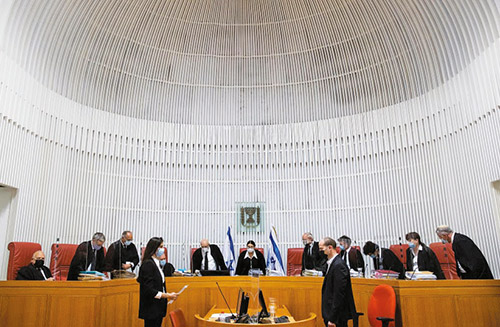
An expanded nine-justice panel of the High Court of Justice has ruled to recognize conversions by the Reform and Masorti (Conservative) movements in Israel for the purposes of citizenship.
Eight of the nine justices agreed with all aspects of the landmark ruling, while Justice Noam Sohlberg preferred to delay applying it for 12 months from the swearing in of a new government.
The decision set off a firestorm of criticism from Orthodox political parties who vowed to pass legislation to overturn the ruling and threatened not to enter any coalition without promises to do so, while Prime Minister Benjamin Netanyahu’s Likud Party also denounced the ruling.
Reform and Masorti leaders as well as liberal and left-wing political parties lauded the decision, however, calling it a victory for democracy and a blow against the Orthodox religious establishment.
The decision was 15 years in the making, after the Reform and Masorti movements filed a petition to the High Court in 2005 demanding that citizenship be granted to several non-Israeli nationals who converted through their conversion systems in Israel.
In 1988, the High Court ruled that non-Orthodox conversions performed outside of Israel must be recognized for the purposes of aliyah and citizenship, but did not extend that recognition to non-Orthodox conversions performed in Israel itself.
According to the Reform and Masorti movements, they perform only 30 to 40 such conversions every year, approximately 10% of all non-Orthodox conversions annually.
Trying to pre-emptively defray criticism, the High Court said in its ruling that it had no religious implications and only dealt with the secular-law questions of the right to obtain citizenship. Further, the justices specifically noted the 15 years in which the Knesset had not acted to resolve the issue as a clear sign that further patience would not help and that, however grudgingly, the judicial branch had to step in to resolve the dispute.
The justices wrote that the non-Orthodox movements have well-established communities with a Jewish identity in Israel, maintain communal Jewish institutions, conduct conversions in an organized manner and are part of broader non-Orthodox denominations around the world.
The justices noted that the Knesset extended the Law of Return and Israeli citizenship to converts back in 1970, but had failed since then to define exactly what conversion means and who can perform it.
As long as the legislature has not determined otherwise, those who convert in Reform and Conservative communities in Israel should be recognized as Jews for the purpose of the Law of Return, wrote the justices.
Taking a shot at the political class, the justices also said that their ruling only applied as long as the Knesset did not pass a law explicitly denying the Jewishness of non-Orthodox converts, which the charedi parties in the Knesset have now promised to do.
Coming three weeks before elections, this has sparked a huge conflagration between Israel’s political parties, and the fallout will have ramifications for Israel’s relationship with Diaspora Jewry, in particular the predominantly non-Orthodox U.S. Jewish community.
The Reform and Conservative movements have repeatedly insisted that they follow strict guidelines regarding converting non-Israeli nationals and note that they perform just several dozen such conversions every year.
Director of the Reform Movement in Israel Rabbi Gilad Kariv, who is also fourth on the Labor party’s electoral list, lauded the ruling, saying the court decision was a boost for democracy and the Jewish character of the state.
“The High Court defended the core values of the state of Israel as the state of the Jewish people and as a democratic state that is obligated to provide freedom of religion and conscience for its people in the verdict,” said Kariv. “In the ruling the High Court retained the simple fact that since Israel was established the Knesset has avoided giving the Rabbinate a monopoly regarding conversion to Judaism, and we will make sure that this will remain in the future. The decision doesn’t impose anything onto the Rabbinate or onto the Orthodox communities, yet it claims in what should have been obvious: The state of Israel, as the state of the Jewish people, needs to respect the different religious communities within the people equally and without discrimination.”
The liberal religious-Zionist organization Neemane’i Torah Va’Avoda said the ruling was “foreseeable due to the long-term ultra-Orthodox obstinacy” over conversion. “It is a pity that when politicians are unable to agree on a solution, they pass it on to the court to do the job in their stead. We hope that the religious-Zionist public will learn their lesson and in future will not hesitate to take the initiative and lead in matters of religion and state.”













